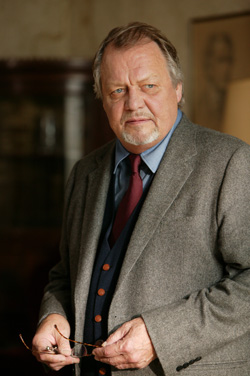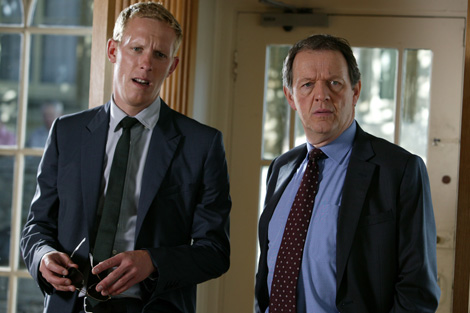
Do our eyes deceive us?
Could it be?
Yes, indeed it is . . . David Soul! Hutch of “Starsky &” or Joshua Bolt of Here Come the Brides if you prefer. (And I do.)
He’s all tweedy and disheveled as an American professor invited to lecture at Oxford. His area of expertise is “criminal dangerousness,” the idea that it is possible to gauge how likely a person is to commit a violent crime simply by examining, among other things, that person’s social environment and IQ. Alfred B. Heilbrun, Jr., of Emory University proposed the theory in the 1990s and it was controversial then; even more so recently as some governments are using criminal dangerousness as an excuse to imprison certain individuals despite the fact that they haven’t committed a crime.
All of which is to say that the Oxford audience greets Dr. Paul Yelland aka David Soul not with approval, but with jeers and taunts that really seem to shake him up. When he turns up dead about 10 minutes into the episode, we realize he had good reason to feel threatened.
Was his murderer one of the protestors who stormed into his lecture or was it someone with a more personal axe to grind?
The investigation centers on the faculty and staff of the Department of Criminology at Oxford. (Turns out there really is a Centre for Criminology at Oxford. And here I thought all of the studies there involved reading obscure tomes in obscure languages.) At the top of the faculty food chain is Anne Rand (Nancy Carroll). I’ll admit I wished she had possessed a more threatening knowledge of her chosen subject. To me, she came off as a poser, but maybe that was the point since she clearly rubbed Sergeant Hathaway the wrong way from the start. The scenes in which they lock horns were pretty great. In fact much of the dialogue writer Simon Block provides is the sort of banter that fans love to hear between Lewis and Hathaway, and between Lewis and Dr. Hobson whom we see first in this episode attending Paul Yelland’s lecture in the company of none other than D.I. Alan Peterson (Jason Durr).

The murder investigation ties up sensibly, if a bit predictably, and the relationships between our main characters are inched forward a little bit. One thing that troubled me, however, was the first time we see Hathaway in this episode. Home alone in a white hoodie and jeans, curled up in his big leather chair, and pouring himself a single malt. What is on your mind James?
Even more troubling is that, from all accounts, we’ll only have one more series in which to find out. After Series 6 was put to bed, there were whispers from insiders such as Colin Dexter, who wrote the Inspector Morse novels and who consults on the Inspector Lewis series, that Lewis had run its course. In fact, the very end of “The Indelible Stain” held a few indications that it was intended to be the very end of Lewis. Nevertheless, a commitment for a Series 7 was made early this year, and it is being filmed now.
But that—much as it pains me to say it—is likely to be the last of Lewis.
If you count his tenure on Inspector Morse, Kevin Whately has been portraying Robbie Lewis for more than 25 years. As he approaches the real-life retirement age for members of the police force, he’s ready to move on to other things. Here’s a link to a brief interview he gave in January.
More recently, Laurence Fox told The Telegraph that the next series would be the last for Lewis, that he and Kevin Whately were in agreement on the idea, and that he and his wife Billie Piper (whom you know from Doctor Who and/or Secret Diary of a Call Girl) are considering a move to the U.S.
We’ll have Endeavour, the Inspector Morse prequel, to tide us over, but it won’t be quite the same thing. After all this time, Lewis has left his own indelible mark on those of us who watch and love the series.
Leslie Gilbert Elman is the author of Weird But True: 200 Astounding, Outrageous, and Totally Off the Wall Facts. Follow her on Twitter @leslieelman.
Read all of Leslie Gilbert Elman’s posts for Criminal Element.

Ha! I was watching this and thinking of you @Leslie Gilbert Elman.
Tell me if as a television critic you have thought much about a phenomenon that I observed at work in this installment of Lewis; the phenomenon that on these shows the killer is always the biggest star outside of the two principals. Always.
Now, you have to use BBC rules to navigate this and just go by ‘recognizable’ as opposed to the American idea of ‘star’, but the second [****spoiler alert!****] David Calder appeared onscreen (overplaying the mild mannered professor just a tad I thought) I told my husband ‘that’s the killer’. He says that I ruin all TV mysteries for him and I always use this theory.
Under this rubric eliminating suspects works like this; (a) it’s never any of the attractive young people played by virtual unknowns (one of them is usually the next victim as in this case and ‘Generation of Vipers’ as well) and (b) just work up the list of recognizable actors and your top man or woman will get the juicy murderer role. It didn’t work on ‘Fearful Symmetry’ because that was a cast of pretty much unknowns to me though the murderer was obvious from the second he appeared on the screen as well for other reasons, not least of which was his overplaying of the mild-mannered just a tad as well. Simon Block wrote some particularly nice and juicy and need I say vintage Morse style dialog for this killer I though didn’t he. Just wonderful but alas not a surprise.
It works for stuff like Marple and American shows too especially Law & Order. It is particularly in evidence when you look at 1980s TV shows. Of course, Calder is nobody here, but any frequent watcher of British TV knows him. David Soul was unrecognizable to me and anyway he was the victim (another use of recognizable stars on the wan that is common on murder shows).
Just once it would be cool if the bright young thing like when Elizabeth Hurley appeared on Morse in 1988 (in only her second acting role on film) or say the Jake Curran character was the killer.
Or maybe I am over-thinking this.
Overthinking? Join the club!
I agree about this phenomenon and sometimes it irks me when an actor or actress I particularly like turns out the be the killer. I’m thinking of one instance in the last series of Lewis that made me sad because I really felt a favorite of mine was wasted as the baddie. (No spoilers, but you can probably guess.)
Actually, I was going to mention David Calder in the blog because he turns up in everything so even if Americans don’t know his name they’re sure to recognize his face if they’ve watched anything from the U.K. ever. I wouldn’t automatically think “bad guy” when I see him though. On the other hand, when I see Patrick Baladi (who plays Robert Fraser in this episode) I always think “oh he seems nice, but you can’t trust him” because I’ve seen him in that role more than once. Poor guy! lol